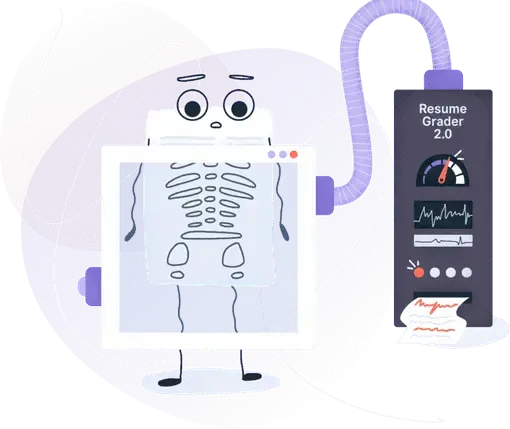Reliability Skills for a Resume: A Complete Guide in 2026
Here are the top ways to show your Reliability skills on your resume. Find out relevant Reliability keywords and phrases and build your resume today.


Is your resume ATS-friendly?
Drop your resume here or upload a file to find out if the skills in your resume are readable by an ATS.
In today’s fast-paced world, where remote work and tight deadlines are the norm, being reliable makes you a cornerstone of any team. Think about it: who wouldn’t want someone they can count on to meet deadlines or to stay calm when things get messy?
This guide is here to help you make your reliability skills leap off the page and onto your next big opportunity.
Let’s transform those everyday responsibilities into resume gold, proving you’re the steady hand every employer dreams of hiring.
Key takeaways
- Reliability skills show your ability to consistently maintain high standards and earn trust in professional settings.
- Show reliability in your summary, work experience, skills, and achievements sections, using specific examples and measurable results.
- Strengthen reliability by using organizational tools, setting realistic deadlines, and staying calm under pressure.
- While no specific certifications exist, platforms like Coursera or LinkedIn Learning can help showcase dedication and commitment.
- Study the language of the company and the job posting and try to mirror it on your resume.
What are reliability skills for a resume?
Reliability skills are the traits and abilities that demonstrate you can be counted on to deliver results and follow through on commitments consistently. These skills show hiring managers that you’re dependable, adaptable, and capable of handling responsibilities without constant supervision.
They are valuable in industries where consistency and trust are essential. Fields like healthcare, customer service, and project management demand professionals who can handle responsibilities without fail and maintain quality under pressure. These abilities ensure smooth operations and success in roles where dependability is non-negotiable.
Complement your reliability with these soft skills for a standout resume.
Top soft reliability skills for a resume
- Accountability
- Flexibility
- Consistency
- Attention to detail
- Problem-solving
- Collaboration
- Communication
- Work ethic
- Stress management
Discover the hard skills that employers value alongside reliability.
Top hard reliability skills for a resume
- Proficiency in Microsoft Project
- Expertise in Asana or Trello for task scheduling
- Experience with quality assurance protocols (ISO standards)
- Data analysis using MS Excel or Tableau
- Risk management frameworks (e.g., FMEA)
- Workflow automation with Zapier
- Process optimization using Six Sigma methodologies
- Technical troubleshooting in IT systems
- Compliance monitoring with GDPR or HIPAA standards
- Deadline enforcement through project tracking tools like Jira
Here’s when reliability turns a good resume into a great one.
When to put reliability skills on a resume
Reliability skills on a resume are essential to showcase when applying for roles where trust and consistency directly affect outcomes. Reliability can mean different things in different settings, for example, jobs in logistics often require workers to ensure timely deliveries, while remote roles demand self-management and accountability.
Highlight these skills when applying for leadership positions, as they demonstrate your ability to inspire confidence in a team. Similarly, reliability is critical in startup environments, where flexibility and follow-through can shape a company’s success.
Any role involving long-term project timelines or collaborative work also benefits from candidates who emphasize their reliability, as these qualities foster team cohesion and productivity.
PRO TIP
Include endorsements and recommendations from colleagues or supervisors on your LinkedIn profile to underscore your dependability. Reference these on your resume to enhance your credibility.
Here’s how to ensure your reliability skills catch the recruiter’s eye.
How to list reliability skills on a resume
Pairing the right examples with a focus on reliability can make your resume even more impressive.
Here are some useful tips to keep in mind:
- Align your reliability skills with the job description by emphasizing terms like “dependable,” “trustworthy,” or “consistent performance.”
- Use impactful action verbs like “ensured,” “delivered,” “maintained,” or “monitored” to demonstrate your reliability in specific tasks.
- Feature instances where your reliability directly impacted team or project success, such as “facilitated team collaboration to complete a high-priority project ahead of schedule.”
- Mention roles where dependability earned you additional responsibilities or trust, like “entrusted with onboarding new team members due to consistent performance.”
- Incorporate examples of how you demonstrated reliability under pressure, such as “consistently delivered results during high-pressure quarterly reporting periods.”
See how these tips can elevate your resume with a practical example below.
Resume sample for showing reliability skills on a resume
Liam Carter’s Business Operations Manager resume is a great example to guide your own. Try our free template and easy-to-use AI resume builder to create a version that underlines your unique strengths and experience.
Liam Carter
Business Operations Manager
(312) 555-927X | l.carter@enhancv.com | @LinkedIn | Chicago, IL
Summary
Dedicated Business Operations Manager with 8+ years of experience driving operational excellence and fostering reliability within high-performing teams. Proven success in streamlining processes, enhancing workflow efficiency, and ensuring consistent delivery of business objectives. Skilled in leveraging tools like Asana, Jira, and Tableau to monitor metrics, optimize operations, and support cross-functional collaboration. Recognized for creating dependable systems and meeting critical deadlines under pressure.
Experience
Business Operations Manager
PayPal, Chicago, IL
March 2022 – Present
- Spearheaded process improvements across multiple departments, increasing operational efficiency by 20%.
- Implemented task management systems like Jira and Asana to enhance project visibility and ensure timely delivery.
- Collaborated with cross-functional teams to resolve bottlenecks, reducing turnaround times by 15%.
- Designed and tracked key performance metrics, achieving a 98% adherence rate to operational goals.
- Established best practices for team accountability, enhancing overall project reliability.
Operations Analyst
BrightWave Marketing, Chicago, IL
May 2017 – February 2022
- Managed daily operations, achieving a 95% on-time delivery rate for critical business processes.
- Developed automated workflows to streamline routine tasks, reducing manual errors by 30%.
- Analyzed operational data to identify inefficiencies, implementing solutions that improved productivity by 25%.
- Coordinated cross-departmental projects, ensuring consistent alignment with organizational objectives.
Education
Bachelor of Science in Business Administration
University of Illinois, Chicago, IL
May 2017
Certifications
- Project Management Professional (PMP) (2020)
- Operational Excellence Certification (2019)
- Advanced Workflow Optimization (2018)
Skills
- Operational process improvement
- Metrics tracking and analysis
- Workflow automation tools: Jira, Asana, Trello
- Proficiency in Excel and PowerPoint
- Cross-functional collaboration and coordination
- Deadline management and accountability
- Quality assurance and compliance
Languages
- English (Native)
- Spanish (Working proficiency)
- French (Conversational)
Take advantage of Enhancv’s free resume checker to make sure your reliability skills pass ATS screenings with ease.
Is your resume good enough?
Drop your resume here or choose a file. PDF & DOCX only. Max 2MB file size.
Let’s discuss how to illustrate these skills in a way that makes an impression.
Where to put reliability skills on a resume
Reliability skills can be featured throughout your resume to prove your dependability and consistency.
Here’s where to include them:
- Summary or Objective Statement: Outline your reliability, emphasizing skills like time management and accountability, along with achievements such as maintaining consistent performance under pressure.
- Work Experience: Show specific examples of reliability, like managing multiple projects without missing deadlines or earning recognition for dependable performance.
- Skills: Highlight specific reliability skills, such as managing multiple tasks efficiently and adapting to changing priorities.
- Achievements: Include awards or recognition, such as “Received Employee of the Month for outstanding consistency in project delivery.”
- Cover Letter: Expand on how your reliability has contributed to organizational growth in both your resume and cover letter.
Here’s how to present reliability clearly across your resume.
How to present reliability skills in the summary
Your summary is where you let employers know they can count on you. Think of it as your chance to highlight how your dependability has made a real impact—keeping projects on track or helping your team succeed.
Keep it short, focused, and full of examples that show why you’re the reliable choice for the job.
Here’s a Logistics Coordinator resume summary that emphasizes reliability as a key quality.
How to present reliability skills in the experience section
Your experience section is where reliability shines through tangible examples. Focus on specific situations where your dependability helps keep things running smoothly. Tailor each part of your resume to the job description and don't forget to use action verbs and numbers. Thus, you’ll have a better chance of getting an interview call.
Check out this example from an Event Coordinator resume.
- •Coordinated 50+ corporate events annually, ensuring all deadlines were met and client expectations exceeded.
- •Managed vendor contracts and schedules, maintaining a 95% on-time delivery rate for event materials.
- •Implemented a tracking system for event logistics, reducing errors and improving efficiency by 30%.
How to present reliability skills in an achievements section
Your аchievements section is the perfect place to prove how your dependability made a real impact.
Skip the vague stuff and get specific. Think about the instances you completed critical projects on time without cutting corners and kept reports spotless to support solid decisions.
For example, as a Project Manager, your achievements section might look like this:
Real-world proof of reliability
- Google’s search engine processes billions of queries daily with near-perfect uptime, earning its reputation as the most dependable online tool.
- Swiss trains, with a 92% on-time performance rate, have become a global symbol of reliable public transportation.
- The Eiffel Tower, built in 1889 as a temporary structure, remains a reliable symbol of structural integrity and innovation over 130 years later.
Which job roles require reliability skills
Following through and delivering results is the essence of reliability. It’s what makes someone important when challenges arise.
Let’s look at the careers where this trait truly sets people apart.
- Customer service agent
- IT support
- Construction superintendent
- QA tester
- Financial analyst
- Compliance officer
- Maintenance technician
- Account manager
- Security officer
- Social worker
Let’s see how you can grow your reliability skills, even without work experience, and create a solid starting point for your career.
Reliability skills progression for students, interns, and juniors
Reliability develops over time, as you handle more responsibilities and face new challenges. Students begin by learning to manage their commitments, while interns tackle the demands of real-world tasks. Junior professionals focus on proving they can be trusted to follow through consistently, even when challenges arise.
Here’s how reliability builds and strengthens as you progress through the first stages of your career path.
Students examples:
- Meeting project deadlines and showcasing early dependability in managing academic responsibilities.
- Completing group assignments and ensuring tasks were divided fairly and everyone contributed on time.
- Volunteering as a team leader for class projects, coordinating schedules, and keeping the group on track.
Intern examples:
- Updating supervisors on project progress,maintaining clear communication, and delivering tasks ahead of schedule.
- Assisting in coordinating timelines across teams.
- Taking ownership of assigned tasks, meeting deadlines, and exceeding expectations.
Junior examples:
- Managing under-mentoring client deliverables and ensuring all timelines were met with high-quality results.
- Resolving scheduling conflicts in team projects. Preventing delays, and keeping workflows on track.
- Building a reputation as a dependable team member who ensures nothing falls through the cracks.
How to quantify reliability skills
When featuring reliability skills on your resume, it’s important to use specific metrics and examples that prove your ability to maintain high standards.
Here’s how you can present your reliability with confidence:
- Highlight deadlines met: “Completed 98% of assigned tasks on or ahead of schedule over a 12-month period.”
- Show error reduction: “Maintained a 99% accuracy rate in monthly reports, reducing errors by 30% compared to the previous year.”
- Demonstrate task efficiency: “Improved task turnaround time by 20% by streamlining workflows and prioritizing effectively.”
- Illustrate team trust: “Selected as the primary point of contact for a team of 10 during a high-stakes project, ensuring seamless communication and timely delivery.”
- Prove consistency: “Maintained perfect attendance and 100% deliverable completion during a 6-month internship.”
- Quantify the impact on team performance: “Reduced team delays by 20% by implementing an accountability system for task tracking.”
Four tips on how to improve your reliability skills
Improving reliability is a skill that benefits both your personal and professional life. By taking deliberate steps to improve this trait, you increase your value in any team or environment.
Here are some actionable tips to strengthen your reliability skills and make a lasting impact.
- Set clear deadlines and stick to them: Use tools like Google Calendar or Trello to keep track of tasks and ensure nothing slips through the cracks.
- Adopt tools to stay organized: Apps like Asana or Notion can help you streamline workflows and improve consistency.
- Seek feedback: Ask colleagues or supervisors how you can better support them to improve reliability in team settings.
- Learn to say NO when necessary: Taking on too much can hurt reliability. Focus on commitments you can genuinely meet.
Frequently asked questions about reliability skills
Are there certifications that can showcase reliability?
While there aren’t certifications specifically for reliability, completing courses on platforms like Coursera or LinkedIn Learning can demonstrate commitment, consistency, and follow-through—key traits of being reliable.
How can I underscore reliability when switching careers?
Focus on transferable skills that demonstrate your dependability. Use examples where you met deadlines or handled responsibilities, regardless of the industry.
How do I address a gap in work history while demonstrating reliability?
Acknowledge the gap honestly and focus on how you used the time productively. For instance, mention if you volunteered, pursued education, or managed personal responsibilities. Frame it as a period of growth, emphasizing any skills or qualities you strengthened during that time.
How do I reflect reliability when I’ve held multiple short-term jobs?
Show reliability in short-term jobs by emphasizing achievements like meeting deadlines or exceeding goals. In your summary or cover letter, explain the roles’ nature (e.g., contract work) and underline consistent performance across varied environments.
Conclusion
Reliability is a key trait that builds trust and drives success in any role. Showing it on your resume through measurable achievements and clear examples proves you’re someone employers can count on. Use this guide to highlight your dependability and stand out in a competitive job market.
Make one that's truly you.




